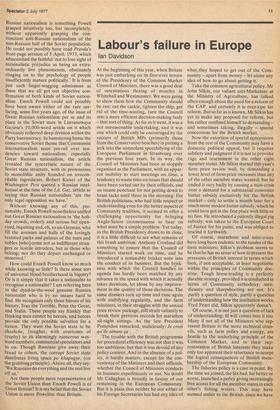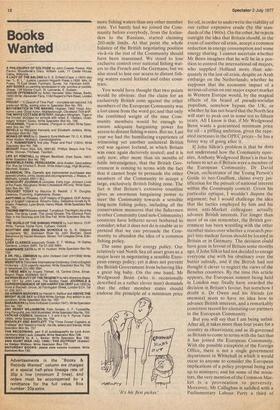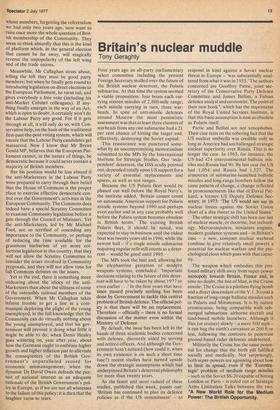Labour's failure in Europe
Ian Davidson
At the beginning of this year, when Britain was just embarking on its first-ever tenure of the Presidency of the Common Market Council of Ministers, there was a good deal of ostentatious flexing of muscles in Whitehall and Westminster. We were going to show them how the Community should into a more efficient decision-making body — that sort of thing. As far as it went, it was a not unreasonable undertaking, and it was one which could only be encouraged by the success of British MPs (primarily those from the Conservative benches) in putting a jerk into the somnolent speechifying of the European Parliament in Strasbourg over the previous four years. In its way, the ,,Council of Ministers had been as sloppily organised as the Parliament, with an appar- ent inability to start. meetings on time, a tendency to waste time on issues that should have been sorted out by their officials, and an insane penchant for not getting down to brass tacks until three in the morning. For British politicians, who had little respect or understanding even for the better aspects of Community tradition, it seemed to offer a challenging opportunity for bringing Anglo-Saxon commonsense to bear on what must be a simple problem. Yet today, as the British Presidency draws to its close, it is a little difficult to see what remains of this brash ambition. Anthony Crosland did something to ensure that the Council of Ministers started work on time, and he introduced a noticeably brisker note into the conduct of its business. But the brisk-
ness with which the Council handles its agenda has hardly been matched by any
advance in the speed with which it actually takes decisions, let alone by any improve- ment in the quality of those decisions. The same dossiers turn up time and time again with stultifying regularity, and the farm ministers, in their struggles with the annual price review package, still strain valiantly to break their previous records for marathon all-night sittings. As the late President Pompidou remarked, maliciously: Je croii qu'ils aiment ca . .
The trouble with the British programme for procedural efficiency was not that it was too ambitious, but that it was devoid of any policy content. And in the absence of a pol- icy, it hardly matters, except for the con- venience of the Ministers and their officials, whether the Council of Ministers conducts its business expeditiously or not. No doubt Mr Callaghan is broadly in favour of our remaining in the European Community. But it is plain that neither he nor either of his Foreign Secretaries has had any idea of what they hoped to get out of the Com- munity — apart from money — let alone any idea of how to go about getting.it.
Take the common agricultural policy. Mr John Silkin, our valiant anti-Marketeer at the Ministry of Agriculture, has talked often enough about the need for a reform of the CAP, and certainly it is over-ripe for reform. But so far as is known, Mr Silkin has yet 10 make any proposal for reform, but has rather confined himself to demanding— and sometimes taking, illegally — special concessions for the British market.
Now the extortion of special concessions from the rest of the Community may have a domestic political appeal, but it requires subtlety and judgment if it is not to provoke rage and resentment in the other eight member states. Mr Silkin started this year's farm price review well, by demanding a lower level of farm price increases than any of the other member states wanted; but he ended it very badly by causing a mini-crisis over a demand for a substantial consumer butter subsidy exclusively for the British market — only to settle a month later for a much more modest butter subsidy, Which he could have got in the first place with little or no fuss. He introduced a patently illegal pig subsidy, was taken to the European Court of Justice for his pains, and was obliged to rescind it forthwith.
Of course, marathons' and inini-crises have long been endemic to the tussles of the farm ministers; Silkin's problem seems to be that he has no sense of how to-present the pressures of British interest in terms which look, if not acceptable, at least negotiable within the principles of Community doc- trine. Tough horse-trading is a perfectly durable strategy, provided it is conducted in terms of Community orthodoxy; men- dicancy and sharpshooting are not. It's partly a question of style, partly a question of understanding how the institution works. Fred Peart did, Silkin apparently doesn't.
Of course, it is not just a question of lack of understanding; ill will comes into it too. Many if not all of the Ministers who rep- resent Britain in the more technical coun- cils, such as farm policy and energy, are hostile to the underlying principle of the Common Market, and in their rep- resentation of British interests they make only too apparent their reluctance to accept the logical consequences of British mem- bership of the European Community.
The fisheries policy is a case in point. By the time we joined, the Six had, for better or worse, launched a policy giving increasingly free access for all the member states in each other's fishing waters. This may have seemed unfair to the British, since we have more fishing waters than any other member state. Yet barely had we joined the Com- munity before everybody, from the Icelan- ders to the Russians, started claiming 200-mile limits. At that point the whole balance of the British negotiating position vis-à-vis the rest of the Community should have been reassessed. We stood to lose exclusive control over national fishing wat- ers to the French and the Germans; but we also stood to lose our access to distant fish- ing waters round Iceland and other coun- tries.
You would have thought that two points would be obvious: that the claim for an exclusively British zone against the other members of the European Community was a lost cause from the word go; and that only the combined weight of the nine Com- munity members would be enough to ensure adequate bargaining power for access to distant fishing waters. But no. Last year we had the humiliating experience of witnessing yet another unilateral British cod war against Iceland, in which Britain was once again decisively routed; and it is only now, after more than six months of futile intransigence, that the British Gov- ernment is coming to terms with the fact that it cannot hope to persuade the other members of the Community to accept a large, exclusively British fishing zone. The fact is that Britain's extensive coastline gives us enormous bargaining power to steer the Community towards a sensible long-term fishing policy, including all the conservation measures that the fishermen in other Community (and non-Community) countries have hitherto never bothered to consider; what it does not do is enable us to pretend that we can persuade the Com- munity to abandon the idea of a common fishing policy.
The same goes for energy policy. Our relatively vast North Sea oil asset gives us a major lever in negotiating a sensible Euro- pean energy policy; yet it does not prevent the British Government from behaving like a great big baby. On the one hand, Mr Wedgwood Benn (who is occasionally described as a rather clever man) demands that the other member states should endorse the principle of a minimum price 'It's his first picket.' for oil, in order to underwrite the viability of our rather expensive crude (by the stan- dards of the 1960s). On the other, he rejects outright the idea that Britain should, in the event of another oil crisis, accept a common reduction in energy consumption and some energy sharing. I cannot ascertain whether Mr Benn imagines that he will be in a pos- ition to control the international oil majors, who supplied Holland more than ade- quately in the last oil crisis, despite an Arab embargo on the Netherlands; whether he supposes that the economic impact of a serious oil crisis on our major export market in Western Europe would, by the magical effects of his brand of pseudo-socialist populism, somehow bypass the UK; or whether he has not heard that the North Sea will start to peak out in some ten to fifteen years. All I know is that, if Mr Wedgwood Henn wants a guaranteed minimum price for oil — a piffling ambition, given the repe- ated increases in the OPEC prices — he has a funny way of going after it.
If John Silkin's problem is that he does not understand how the Community oper- ates, Anthony Wedgwood Benn's is that he refuses to act as if Britain were a member of the European Community. Dr David Owen, orchestrator of the Young Person's Guide to neo-Gaullism, claims every jus- tification for the pursuit of national interest within the Community context. Given his particular optique, I wouldn't dispute the argument; but I would challenge the idea that the tactics employed by him and his more anti-Market colleagues actually advance British interests. For longer than most of us can remember, the British gov- ernment has been wrestling with the other member states over whether a research pro- ject into nuclear fusion should be located in ,Britain or in Germany. The decision amid have gone in favour of Britain some months ago, if John Silkin had not decided to enrage everyone else with his obstinacy over the butter -subsidy, and if the British had not thought it clever to neglect the views of the Benelux countries. By the time this article appears, the European summit being held in London may finally have awarded the decision in, Britain's favour, but somehow I doubt it. Dr Owen and his friends (or enemies) seem to have no idea how to advance British interests, and a remarkably consistent record for alienating our partners in the European Community.
But you will say that I am being unfair. After all, it takes more than four years for a country as chauvinistic and as ill-governed as Britain to come to terms with the fact that it has joined the European Community. With the possible exception of the Foreign Office, there is not a single government department in Whitehall in which it would occur to anyone to consider the European implications of a policy proposal being put up to ministers; and for some of the minis- ters, the very mention of the Common Mar- ket is a provocation to perversity. Moreover, Mr Callaghan is saddled with a Parliamentary Labour Party a third of whose members, forgetting the referendum we had only two years ago, now want to .raise once more the whole question of Brit- ish membership of the Community. They seem to think absurdly that this is the kind of platform which, in the general election that cannot be far away, will magically reverse the unpopularity of the left wing and of the trade unions.
Meanwhile, Mr Callaghan struts about, telling the left they must be good party members; but when he finally gets round to introducing legislation on direct elections to the European Parliament, he turns tail, and gives everybody a free vote (including his anti-Market Cabinet colleagues). If any- thing finally emerges in the way of an Act, which is open to doubt, it certainly won't do the Labour Party any good. For if it gets through at all, it will only do so, with Con- servative help, on the basis of the traditional first-past-the-post voting system, which will ensure that the Labour Party candidates get massacred. Now I know that Mr Bryan Gould MP, believes that the European Par- liament cannot, in the nature of things, be democratic because it could never contain a majority of British members.
But his position would be less absurd if the anti-Marketeers in the Labour Party were prepared to carry through their belief that the House of Commons is the proper place to exercise effective democratic con- trol over the Government's activities in the European Community. The Commons does indeed have a special Scrutiny Committee to examine Community legislation before it gets through the Council of Ministers. Yet the anti-Marketeers, led by Mr Michael Foot, are so terrified of conceding any importance to the Community, or perhaps of reducing the time available for the gratuitous barbarism of yet more col- lectivist legislation in this country, that they will not allow the Scrutiny Committee to consider the issues involved in Community proposals, and they will not allow time for full Commons debates on the issues.
Yet in the end, there is something more endearing about the idiocy of the anti- Marketeers than about the silliness of some of the ostensibly rational members of the Government. When Mr Callaghan takes infinite trouble to get a line in a com- munique deploring the plight of the young unemployed, in the full knowledge that the Community can do virtually nothing about the young unemployed, and that his gov- ernment will prevent it doing what little it might be able 'to do; when Denis Healey goes wittering on, year after year, about how the Germans ought to embrace higher 'growth and higher inflation just to alleviate the consequences of the British Gov- ern meat 's unparalleled record for economic mismanagement; when the dynamic Dr David Owen defends the pur- suit of national interest as an adequate rationale of the British Government's pol- icy in Europe, as if we are not all witnesses to the failure of this policy; it is then that the laughter turns to tears.




































 Previous page
Previous page